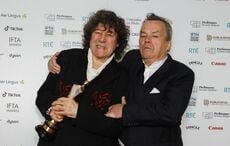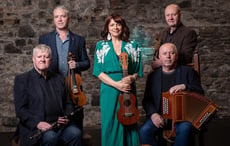THE Donegal X-Press has emerged as one of the premier Irish American roots rock groups in the country, with a reputation built on high-energy that audiences on both sides of the Atlantic are soaking up.
Brad Dunnells (guitar and vocals) and Jason Tinney (harmonica and vocals) began collaborating and writing songs in the late 1990s with the hope of rejuvenating Irish American music. Each band member has a musical side project in the works that take the musicians into areas of hip hop, folk and rock, and Dunnells and Tinney are no exception.
They have a group of their own called the Wayfarers, which was formed with the husky pipes of singer Laura Malkus that makes beautiful music within the tangled roots of American folk, rock, country and blues. Add a sweet Celtic fiddle in the mix for good measure and you have a winning collection of songs called Sorrow and Snakes.
"Lucinda Williams" has a galloping country shuffle masked in a funky backbeat, and it serves as a clever kiss-off to the slick country chanteuses that call Nashville their home lately. "If you're gunning for those bright lights that come with being a Nashville star/just keep being who you ain't/instead of being who you are," snarls singer Dunnells.
I spoke with Dunnells on the eve of his tour of Ireland about the new disc as well as the status of Donegal X-Press, which is one of this reviewer's favorite Irish outfits. Check them out at dxplive.com. Here's how the conversation went.
Congratulations on a great CD!
Thanks! I'm really proud of it. It took a long time to get together.
What took so long?
The songs were written, so we didn't really go into the studio without knowing what we were doing. We did enlist the help of some area musicians that had expertise on certain styles. I think that gave some breath of life from track to track. Of course, there's the money aspect.
What kind of reaction have you gotten from the CD?
We have gotten some nice reviews from some of the local papers, but it's always difficult to reach some of the national music periodicals.
There's one song on the CD, "Lucinda Williams," that seems to take a swipe at the wave of slick country pop stars like Carrie Underwood that seem to be everywhere. Is that fair to say?
Absolutely. I don't know if you ever watched the show Nashville Star. It has those contestants that are more and more Hollywood on their sound. I guess we could stay up all night and debate if that's a good thing or not.
I think the slicker you get, you lose some grounding and appeal. You might even lose a little integrity in the process as well, so I think that song speaks to that.
Was Lucinda Williams an influence on the band's sound?
Definitely. Car Wheels on a Gravel Road was certainly an influence. It was a basis of production. Some of the last few records of Steve Earle were really something that influenced us as well.
There is a polished sound that also sounds very roots. It's almost like putting a new paint job on an old car. I think that encapsulates what people call the alt-country genre.
There's also a really funky back beat on that track as well. You don't usually mix country and funk, but it worked in a strange way!
I think myself and my band have always tried to bridge styles. Putting funk into the country melodies I thought would be fun.
You're running with both the Wayfarers and DXP. How do you decide which new songs go to a certain band?
That's a good question. I think the Donegal X-Press has evolved more into the alt-country vibe as opposed to the Pogues and Flogging Molly vibe. I think the stuff we play now has definitely an Irish vibe to it, but I think there is more of an Americana vibe that people are picking up on. We are getting more work now doing what I would call secular festivals as opposed to Irish festivals.
Obviously, our set will be heavy on Irish tunes if that is what an Irish festival is paying us to play. I think there is a nice challenge to come up with a bunch of songs that can be played in different venues, and Americans will be exposed to Irish influences in our music and vice versa. We just want to make sure if you come out to see us, you hear something you like and you have a good time.
What kind of music scene do you have in Baltimore? Is it kind to alt-country players?
I think so. There are a lot of country fans both old and new. I think we're technically south of the Mason Dixon line, which makes us southerners. There are some rural parts of the state that really appreciate this kind of music. There are plenty of good alt-country musicians in this area working regularly, so I think it supports a certain scene.
We get a mixed bag at our shows. You have older rather than younger, and they are usually very knowledgeable of the alt-country scene. They tend to be working class people that enjoy the mixture of the old and new.
There is a niche of people who love the singer/songwriter scene and go out of their way to support it. There is a body of old school people who find it interesting to watch a band turn a Johnny Cash tune on its head. We do Lucinda Williams, Steve Earle, Lyle Lovett and a lot of the biggest names of the alt-country genre. We sneak a few Allman Brothers and Stevie Ray Vaughn tracks in there as well for good measure. With three Wayfarers albums, we also have a lot of original music to choose from.
You cut your teeth on traditional tunes and now you have morphed into a more countrified sound. How does the Irish roots of your musical upbringing influence your sound in the music you play today?
I always loved the storytelling in Irish music. I don't think it's a big leap from one to another. In the Irish scene there is a community that follows your work, and I think it's the same for the alt-country scene, though I think this scene is smaller in numbers. They like to share some of these unknown favorites of theirs. You have to reach people through peer to peer word of mouth, Internet, festivals, that kind of stuff.
"Drunk Again" has that classic lonesome blues vibe of a good country song. How did that come about?
I was out of work for two or three years and I couldn't get a job. The band was floundering. I spent some time drinking too much and I guess the song came about from a low period. The blues in that song were pretty real.




Comments